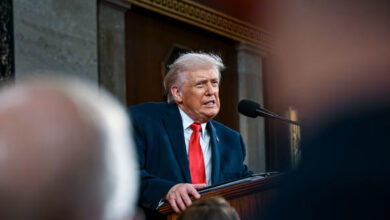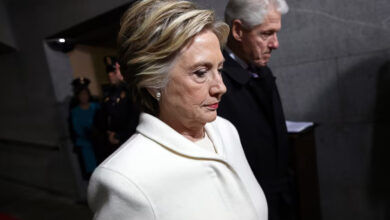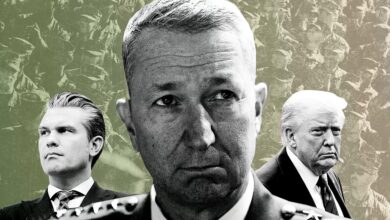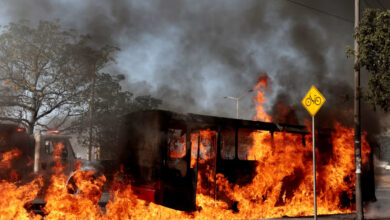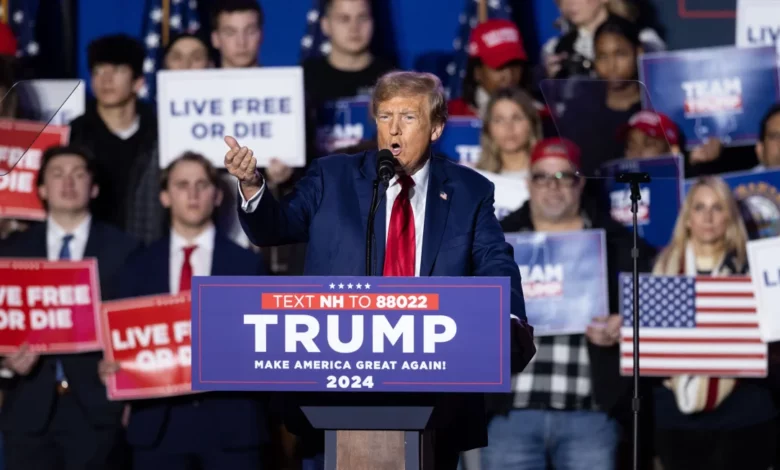
Donald Trump’s extreme rhetoric reminiscent of Nazi propaganda and his penchant for siding with America’s adversaries and autocrats pose a unique challenge to his Republican opponents and, ultimately, US voters.
The ex-president, who has a good chance of being the next commander in chief, warned over the weekend that immigrants are “poisoning the blood” of the United States. And he parroted Russian President Vladimir Putin’s attempts to discredit American democracy in his latest craven genuflection to the ex-KGB officer, who’s been accused of war crimes.
Trump’s comments on Saturday, at a rally in the first-in-the-nation GOP primary state of New Hampshire, are contrary to America’s founding values and political traditions. They are the latest sign that Trump, who sought to overturn the will of the voters after the 2020 election, would act in an even more extreme fashion in a second White House term. His rhetoric is also likely to play into the central premise of President Joe Biden’s reelection campaign – that he’s the only option to thwart a return to power by an ex-president who could destroy US democracy. It is not yet, however, helping the incumbent in polls that show him trailing Trump in vital swing states.
Even if Trump’s rhetoric demands a sense of proportion from his critics, his aberrant behavior also requires an understanding of his inflammatory aims and a sober evaluation of the exact threat he poses to democratic values around the world, which are under threat from autocracies in China, Russia, Iran and elsewhere.
Not taking Trump’s remarks at face value would be a mistake, because even with him out of office, they are having a destabilizing political impact. With his searing language about immigration, Trump is seeking to unleash hostility and fear against immigrants and to weaponize anxiety that White, Christian preeminence is under threat from outsiders of different ethnic groups and creeds. His comments put every racial, ethnic and religious minority at risk at a time of already angry political polarization. He is also exaggerating the threat from undocumented migrants to play on the Biden administration’s failure to control a surge of arrivals at the southern border. Republicans have long argued the situation is a crisis, and the White House hasn’t come up with a political narrative to counter that.
Violent and often racist immigration rhetoric is central to Trump’s appeal: He used his conspiratorial campaign over ex-President Barack Obama’s birthplace as a springboard for his political career. Slandering Mexicans energized his campaign language right from his first speech in the summer of 2015. And after he tried to overthrow an election, there should be no illusions about Trump’s willingness to eviscerate American political systems to enhance his power. In recent weeks, he’s called his political opponents “vermin,” in another echo of Nazi propaganda, and warned that Biden – and not he – is the real threat to democracy in a shape-shifting move typical of his demagogic style.
At the same time, however, Trump is seeking to draw his critics into a trap. He breaks norms of widely acceptable political speech to create outrage, which invigorates his most fervent supporters and puts his opponents off balance. He knows that his speeches using the imagery of 1930s European fascism cause an explosive reaction in the media, which he can then exploit to argue to his supporters that the “left” is caught up in an conspiracy against him, and by extension, them. The reaction from his critics enables him to stir a response that makes him stronger.
There is also a danger that critiques of Trump that promise the eclipse of democracy may obscure the real risks he would pose in the White House. Former Wyoming Rep. Liz Cheney, a Republican who has courageously spoken out against Trump, is already warning that if Americans elect him next year, he will never leave office. She says the country is sleepwalking to dictatorship. Trump has suggested the Constitution should be torn up. But there’s no sign yet that he would be able to cancel a future general election, even given his current rhetoric.
Still, it’s clear the ex-president is becoming more extreme. He’s always used scorching rhetoric and made promises that would challenge the law, if enacted, to prove to his followers that he remains an outsider who never joined the Washington establishment – despite holding the highest office. His ever more anti-democratic speech upholds his image as a rule breaker that is so popular among his voters. But given that Trump has already been so intemperate, it’s inevitable that new efforts to prove himself will drive him further to the right-wing fringe of US politics.
Rather than the historically loaded analogies from the 1930s, a more likely template for Trump might be an autocrat of the present, like Hungarian Prime Minister Viktor Orban, a hero of the “America First” right of whom Trump spoke admiringly over the weekend. Orban is part of the ideological connective tissue that links Trump, Putin and other leaders who espouse White nationalism, authoritarian rule and orthodox Christianity. They erode political and electoral systems to enhance their own power and weaken the press and the courts — institutions that hold their anti-democratic impulses in check. Orban is Putin’s top ally inside the European Union, and is campaigning, like Trump, to shut off Ukraine’s financial and military lifeline to make it helpless against the Russian leader’s unprovoked and brutal invasion, which he has styled as a proxy war against the West.
Hungary is a nation that is, on the surface, democratic, but has suffered from a strongman’s success in eroding the reputation and institutions that sought to hold Orban to account. It is, therefore, a flashing red cautionary tale for the US.
Most immediately, Trump’s extremism poses grave questions for his main primary opponents – who have lacked the courage to call out his threats for fear of alienating GOP voters – less than a month before voting starts. It also once again exposes the failure of the Republican Party, which once crowed about winning the Cold War against the Kremlin, to stand up to its leader, who constantly gives comfort to US adversaries like Putin.
The ex-president’s voters backed him for many reasons in the last two elections. Some believed the country’s economic and political system had failed them over many years. Others embraced his “America First” ethos after more than a decade of draining foreign wars. Trump voters often argue that people they perceive as establishment “elites” in politics, the media and government look down on them and that Trump was the first politician in years who reflected their cultural and political attitudes.
But after his attempt to overturn the 2020 election, and as he conjures the darkest and most divisive rhetoric of any modern election, there can be little doubt about who Trump is and how he might behave in a second term.
The most profound question raised by his weekend of zealotry and bigotry is this: What does it say about America, its political culture and mood of its people at this critical moment in history, that millions of voters appear ready to embrace his extremism?

